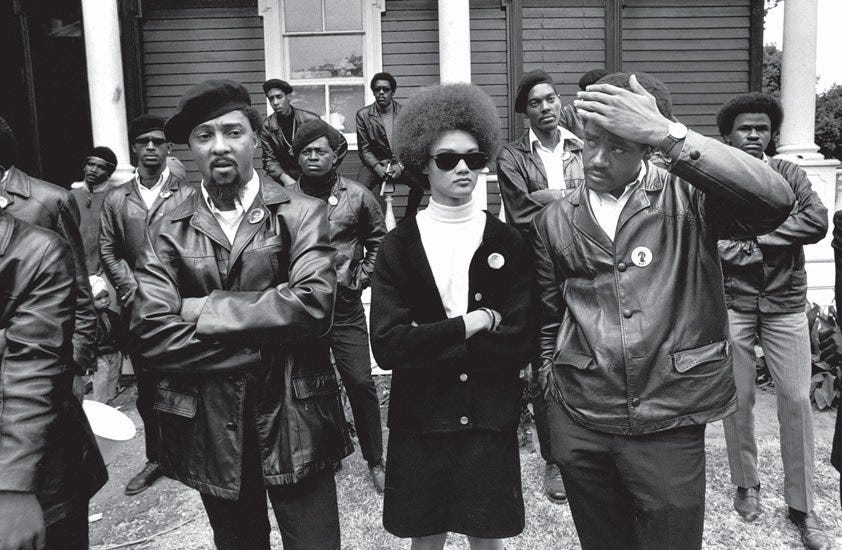Welcome!
Welcome to this week’s Everyday Activist, your weekly guide to turn anxiety into action. Each Sunday, we highlight some pressing issues from the past week and provide you with simple, actionable steps to make a difference.
Topic 1: The Value of the Radical Flank—From Civil Rights to Queer Liberation to Climate Justice
Throughout history, the radical flank of social movements has often been criticized, even by their allies, for being too extreme or uncompromising. Time and reflection reveal that these “radicals” were instrumental in creating the momentum and cultural shifts needed to drive change. They reframed debates, expanded the boundaries of acceptable discourse, and enabled more moderate factions to succeed.
From the Black Panther Party to the Lavender Menace, the contributions of the radical flank illuminate the power of bold action—and offer a roadmap for today’s movements, especially in the fight against climate change.
Lessons from History: How Radicals Changed the Game
The Black Panther Party and the Civil Rights Movement
During the 1960s, the Black Panther Party was viewed skeptically—not only by white Americans, but also by moderates within the Civil Rights Movement. Their militancy, community self-defense programs, and critiques of systemic inequality stood in stark contrast to the nonviolent strategies championed by Dr. Martin Luther King Jr.
In retrospect, however, the Black Panthers’ work was essential. Their programs like free breakfast for children, community health clinics, and advocacy against police brutality drew attention to systemic racism and poverty. Their radical demands for structural change made King’s vision of integration and legislative reform seem both reasonable and urgent. Together, these factions reshaped American society leading to landmark legislation like the Civil Rights Act of 1964 and the Voting Rights Act of 1965.
The Lavender Menace and the Women’s Liberation Movement
In the early 1970s, lesbian activists were dismissed by some feminists in the mainstream Women’s Liberation Movement as a “distraction” from the cause. Betty Friedan infamously referred to them as the “Lavender Menace.” However, these activists boldly reclaimed the label and staged a dramatic protest at the 1970 Second Congress to Unite Women.
The Lavender Menace’s actions forced mainstream feminists to confront their own biases and broaden their movement’s platform to include queer women. Their courage to challenge exclusionary politics enriched the feminist movement and laid the groundwork for LQBTQ+ rights advances in the decades that followed.
ACT UP and Fight Against AIDS
In the 1980s and early 1990s, AIDS activists with the direct-action group ACT UP (AIDs Coalition to Unleash Power) were often vilified for their confrontations tactics—shutting down the FDA, storming St. Patrick’s Cathedral, and interrupting public figures.
But their boldness made the AIDS crisis impossible to ignore. ACT UP’s work led to accelerated drug approvals, public awareness campaigns, and crucial policy changes. Today, their once-radical approach is credited with saving millions of lives and reshaping public health advocacy.
The Radical Flank and Today’s Climate Movement
Much like these historical examples, radical climate groups like Extinction Rebellion, Sunrise Movement, and Just Stop Oil are often dismissed as disruptive or extreme. Their civil disobedience—blocking highways, occupying banks, or disrupting government meetings—may seem provocative.
But these groups highlight the inadequacy of incremental solutions in the face of a climate emergency. Their actions make the moderate proposals of mainstream environmental groups—like carbon neutrality by 2035 or renewable energy investments—appear not only reasonable, but also necessary to stave off catastrophe. Without their urgency, the global response to climate change would likely remain stalled in complacency.
Why It Matters
Radical flanks, whether praised or vilified, create the tension that fuels change. They demand more, dream bigger, and expose the shortcomings of the status quo. Their efforts do not undermine moderates—they strengthen them, creating a space where compromise becomes not just possible, but urgent.
What You Can Do If You Have:
5 Minutes:
Learn about a radical flank in a movement you support. Watch a video or read an article about groups like ACT UP, the Black Panther Party, or Extinction Rebellion. Here’s one of our favorites: ContraPoints’ video on feminist rights movements (2 hours).
15 Minutes:
Share the contributions of these groups on social media. Highlight how their once-controversial tactics helped achieve lasting change.
1 Hour:
Support both moderate and radical groups in today’s movements. Attend a protest.
$:
Donate to organizations across the spectrum—from climate policy advocates like the Sierra Club to activists like Sunrise Movement or Just Stop Oil.
Ongoing Commitment:
Challenge yourself and others to rethink what counts as “too radical.” Advocate for the necessity of bold action alongside incremental reforms. Engage in discussions that emphasize the interdependence of these approaches.
Topic 2: Immigration Actions Planned Under Trump
As President-elect Donald Trump prepares to take office on January 20, 2025, his administration is poised to implement sweeping changes to U.S. immigration policy. These changes, which align with campaign promises, are expected to significantly impact immigrant communities across the nation. Here’s what you need to know and how concerned citizens can respond.
Trump’s Planned Immigration Actions
Trump’s transition team has outlined a series of immediate actions aimed at drastically altering the immigration landscape:
The southern border is expected to be closed on day one, with executive orders prepared to seal it shut;
Reinstatement of Title 42 and declaration of illegal immigration as a national emergency;
Revocation of Biden-era humanitarian parole programs for migrants from countries like Cuba, Haiti, Nicaragua, and Venezuela;
Reimplementation of the Migrant Protection Protocols (MPP), requiring asylum seekers to remain in Mexico during claim processing;
Attempts to end birthright citizenship through executive order.
The administration plans to initiate enforcement actions immediately with raids potentially starting as soon as January 21, 2025, in cities like Chicago, New York, Los Angeles, Denver, and Miami.
Public Opinion and Resistance
While these policies align with a portion of the American public that prioritizes stricter immigration enforcement, they face considerable opposition. According to recent data:
A majority of Americans disagree with the statement that immigrants are “poisoning the blood of our country,” with 60% either completely or mostly disagreeing.
There are substantial differences in opinion based on party affiliation, with 67% of Republicans agreeing with the statement compared to 13% of Democrats.
Alexandria Ocasio-Cortez (AOC) has been a vocal critic of Trump's immigration policies and plans. Her responses to Trump's immigration agenda have been characterized by strong opposition and harsh criticism:
AOC has accused Trump of radicalizing people against immigrants, stating that his rhetoric and actions are "scary" and exacerbate tensions.
She has described Trump's immigration detention facilities as "concentration camps," drawing a controversial comparison to emphasize the severity of the situation.
AOC proposed a "9/11-style commission" to investigate family separations at the US-Mexico border under Trump's policies, indicating her desire for accountability and transparency.
She has argued that Trump's immigration agenda is fundamentally about "ethnicity and racism," rather than actual border security or immigration reform.
In response to Trump's border wall speech, AOC delivered what was described as a passionate and compelling rebuttal, emphasizing both humanity and policy concerns.
What You Can Do If You Have:
20-30 Minutes:
Contact elected officials: Reach out to your representatives to express your concerns and urge them to oppose extreme immigration measures.
Ongoing Commitment:
Stay informed: Keep up-to-date with the latest developments in immigration policy and enforcement actions.
Engage in community outreach: Provide support and resources to immigrant communities in your area, such as legal aid or sanctuary.
Support legal challenges: Donate to or volunteer with organizations that are likely to file lawsuits against unconstitutional immigration policies.
Final Thoughts
History vindicates the radical flank. Their courage, creativity, and persistence force the world to see injustice more clearly and act more decisively. Let’s learn from their legacy and embrace a diverse set of tactics to tackle today’s challenges. Whether you march in the streets or write to your representatives, every action matters.
Persistence is power. Together, we can move the needle.
See you next week,
The Everyday Activist
Subscribe for weekly guidance on turning frustration into action.




